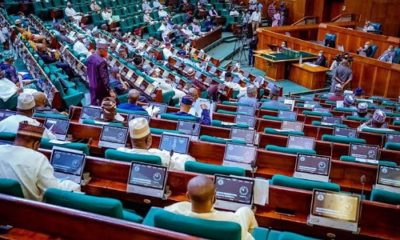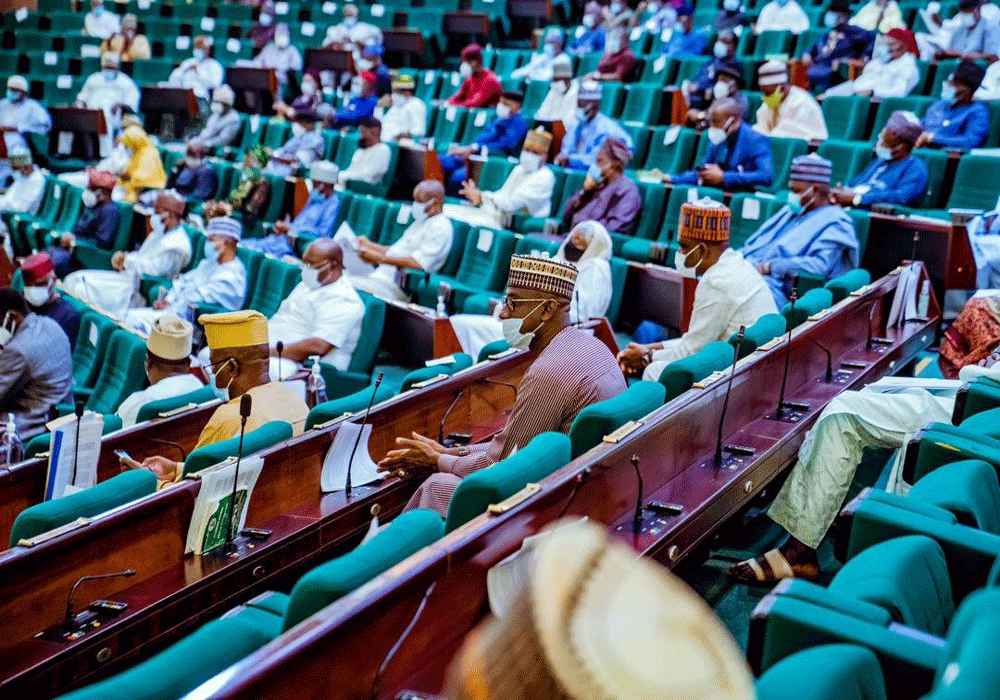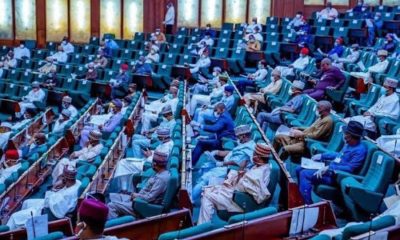Finance
Missing’ $20bn: House of Reps issue fresh ultimatum to Okonjo-Iweala

ABUJA-The House of Representatives has for the second time on Wednesday asked the Minister of Finance, Ngozi Okonjo-Iweala, to submit the full version of the forensic audit report on the alleged missing Nigerian National Petroleum Corporation $20bn to it.
The House gave the first directive on Thursday last week, following a motion moved by its Minority Leader, Femi Gbajabiamila.
On Wednesday (yesterday), the House again asked the minister for the report after Gbajabiamila complained that almost one week following the first resolution, Okonjo-Iweala had not responded.
He said, “Mr. Speaker (Emeka Ihedioha, presiding), we request the Clerk of the House to formally write the Minister to produce that report to every member of this House.
“She has not produced the report, irrespective of the standing resolution of this House. We want to have the full report, not the snippets that they have been flying about.”
The House endorsed his submission and directed the minister a second time to comply.
An auditing firm, PriceWater House Coopers, had carried out the forensic investigation on behalf of the Federal Government.
The Chairman, House Committee on Public Accounts, Mr. Solomon Olamilekan, told reporters shortly after the House rose that the Office of the Auditor-General of the Federation only presented a “highly-condensed version” of the report to the public.
He recalled that in the condensed version, the NNPC was directed to remit a “minimum of $1.4bn into the Federation Account.”
The lawmaker said that, as the committee overseeing public accounts, PAC was duty-bound to ensure that the minister produced the report.
He ordered Okonjo-Iweala to submit the report not later than one week from Wednesday (yesterday).
Olamilekan added, “The PAC, cognisant of the provisions of the Constitution (1999), and empowered by the resolution, hereby requests that the full report on the forensic audit by PWC, which must include the initial raft report, the executive summary, management /internal control letters, should be forwarded to the National Assembly not later than one week from today(Wednesday).”
Meanwhile, the Federal Government has, in spite of the drop in its oil revenue and dwindling allocations to the three tiers of government, insisted that Nigeria is not broke.
“The country is not broke, we have been meeting our obligations despite the challenges we have had with oil revenue streams but we have been doing the best that we can to improve our revenue from the non-oil sector,” the Minister of State for Finance, Bashir Yuguda, said.
Yuguda spoke with journalists after this month’s Federation Accounts Allocation Committee meeting in Abuja on Tuesday night.
The minister who, put the excess crude account at about $2bn, also spoke briefly on the forensic audit report and the amount to be refunded by the NNPC to the federation account.
“I have engaged the minister of petroluem and we have discussed the time frame on the refund of that amount,” he said.
FG, states, LGs’ allocations drop by N188.8bn in January
The drop in crude oil prices market has taken its toll on the federation account as statutory allocations to the three tiers of government witnessed a decline of N188.8bn from the budgeted estimates of N688.94bn to N500.13bn in January.
The N500.13bn which is contained in the communique issued at the end of the FAAC meeting, also represents a decline of N80.25bn over the N580.38bn shared by the federal, state and local governments last December.
The N500.13bn, is made up of statutory allocation of N416.09bn; Value Added Tax, N63.94bn; exchange gain, N8.57bn and refund of N6.33bn made by the Nigerian National Petroluem Corporation to the federation account to settle its indebtedness.
The communique attributed the decline in gross allocation to drop in crude prices from $77.53m in November to $52.34m in December.
It also stated that a 33 per cent decrease in export volume between November and December 2014 translated into a loss of $159.88.
The report read, “The gross revenue of N416.09bn received for the month was lower than the N490.03bn received in the previous month by N73.93bn.
“There was substantial loss of revenue due to further drop in crude oil prices from $77.53m in November to $52.34m in December 2014.
“Also, a 33 per cent decrease in export volume between November and December 2014 translated to a loss of $159.88m.
“The shutdown and shut-in trunks and pipelines at various terminals continued to impact negatively on the revenue performance. Also, non-oil revenues performed below the 2014 budgetary provisions.”
From the statutory allocation, the Federal Government received N194.34bn, representing 52.68 per cent while the states and local governments got N98.57bn and N75.99bn respectively.
Similarly, N39.45bn was shared to the oil producing states based on the 13 per cent derivation principle.
The Federal Government received N9.20bn or 15 per cent from revenue from VAT while the states and local governments got N30.67bn and N21.48bn respectively.
‘Corruption, not oil crash behind Nigeria’s woes’
The All Progressives Congress Vice-Presidential candidate, Yemi Osinbajo, has said that the biggest problem facing Nigeria is corruption and not dwindling oil prices.
Osinbajo stated this in Uyo, Akwa Ibom State, on Wednesday during the presentation of APC’s 2015 manifesto on Securing Nigeria’s Future.
He said, “Nigeria problem, as you know, is not lack of resources. The government of today has tried to give the impression that the problem of the country is that of falling oil prices , which is now below $50 per barrel.
“That is not true, that is not the problem. The problem is the corruption or the theft of resources.”
The former Lagos State Attorney-General and Commissioner for Justice, added that the Federal Government itself had confirmed that over 400,000 barrels of oil are stolen every day from Nigeria.
He put the value of the stolen oil at N3.1tn a year.
Banking
CBN Denies Currency Devaluation

The Central Bank of Nigeria (CBN) has refuted claims of devaluing the.
Earlier reports suggested that the CBN had devalued the Naira, lowering its exchange rate from N631 to the dollar, compared to the previous day’s rate of N461.60 at the Importers and Exporters (I&E) window.
However, the Central Bank of Nigeria (CBN) released a statement on Thursday through its Acting Head of Corporate Communications, Dr. Isa Abdulmumin, categorizing the report as false information.
In the statement titled ‘CBN Has Not Devalued The Naira’, he said the attention of the apex bank was drawn to the news report by an Abuja based newspaper edition of June 1, 2023, titled “CB Devalues Naira To 630/51”.
However, the CBN stated categorically that the news report was replete with outright FALSEHOODS and destabilizing innuendos, ‘reflecting potentially willful ignorance of the said medium as to the workings of the Nigerian Foreign Exchange Market.’
“For the avoidance of doubt, the exchange rate at the Investors’ & Exporters (I&E) window traded this morning (June 1, 2023) at N465/USS1 and has been stable around this rate for a while.
“The public is hereby advised to ignore the news report by Daily Trust in its entirety, as it is speculative and calculated at causing panic in the market,” the CBN spokesman added.
He, therefore, advised media practitioners to verify their facts from the Central Bank of Nigeria before publishing in order not to misinform the public.
Banking
BREAKING: CBN Increases Interest Rate By 0.5%

The interest rate in Nigeria has been raised to 18.5 percent, up by 0.5 percent, from 18 percent where it was pegged in March 2023.
The Central Banks of Nigeria’s (CBN) Monetary Policy Committee (MPC) resolved to this effect at its third meeting of 2023 in Abuja, on Wednesday.
Governor, CBN, Godwin Emefiele, made the disclosure in the communiqué of the MPC’s meeting, thereafter.
While engaging the media at the end of the two-day meeting, Emefiele, said the committee voted to keep the asymmetric corridor at +100 and -700 basis points around the MPR.
In the view of the MPC, rising inflation rate is traceable to the high energy cost and challenges around the supply chain, among others, which lie outside the corridors of the CBN.
Emefiele said, “The current trend in price development would continue to be monitored by the bank with greater collaboration with fiscal authority to address the drivers of inflation.”
Biztellers reports that the CBN had effected six consecutive interest rate increases, which has seen the rate move from 11.5 percent in March 2022 to 18.5 percent in May 2023.
Finance
Dangers Lurk As Nigerians Resort To Refurbished Gas Cylinders

In Nigeria, people have been forced to come up with creative solutions to cope with the effects of inflation and the economic crisis.
These improvised strategies have not only helped individuals save money, but also enabled them to stay afloat during difficult times.
In a concerning development, the recent trend of boycotting the high cost of cooking gas cylinders in Nigeria may pose a greater risk to lives than it does in terms of saving money.
Economy&Lifestyle investigations have revealed that the soaring prices of gas cylinders have reached a point where it has become increasingly challenging for average households to afford them, let alone refill them with gas.
The situation is further exacerbated by the fact that the pump price of kerosene, which would typically serve as an alternative, has become prohibitively expensive.
Upon investigation, it was found that the prices of gas cylinders vary depending on their sizes. A 3kg gas cylinder is priced at N14,000, while a 5kg cylinder costs N16,000. The larger cylinders are even more costly, with a 6kg cylinder priced at N17,000 and a 12.5kg cylinder costing N19,000.
Additionally, the expense continues when it comes to filling these cylinders with cooking gas, as it costs N2,600 for a 3kg cylinder, N5,200 for a 6kg cylinder, N8,950 for a 10.5kg cylinder, and N10,650 for a 12.5kg cylinder.
Consequently, an average household that needs to replace a worn-out 5kg cylinder would have to come up with N20,250 to purchase a new cylinder and fill it with gas, which can be a difficult feat to achieve.
As a result, many people have resorted to refurbishing their old cylinders and trying to use them as best as they can. However, this approach poses a significant danger.
Mrs. Rukayat Adesoji, a trader, shared her experience regarding her gas cylinder, which had become rusted and could no longer stand upright since last month. Due to the exorbitant prices of purchasing new cylinders, she resorted to seeking the assistance of a welder.
The welder patched the legs of the cylinder, repainted it, and ever since then, she has been using the refurbished cylinder for her cooking needs.
She said ““My gas cylinder which was 6kg got rusted and no longer stands erect since last month. When I asked for the price, I was told it was N17, 500. I was discussing it with a friend who advised me to take it to a welder to paint it and construct a new stand. I heeded to her advice and at the end spent just N3, 000 to turn my cooking gas to a brand new.”
Apart from refurbishing cylinders, some people don’t even know when their cylinders will expire. Mrs. Mercy Opara, a hair stylist, falls in that category as she explained: “I am taking my gas cylinder to the welder to spray it for me. It just cost N1, 500.
“The cost of buying a new cylinder is high. I have been using my cylinder for over 7 years and I don’t even know the expiry date. I just pray God blesses me so that I can buy a new one. But this one I am managing will look neat after spraying it for another two years.”
Mr. Adekanbi Joseph, a wielder, said he paints cylinder and “To paint and rebuild a cylinder stand, I charge N4, 500. Many people come here to paint as a new cylinder is now very expensive to get.”
Highlighting the potential dangers of using refurbished cylinders, Mr. Benjamin Hope, the Chief Executive Officer of FKT Cooking gas and general goods, emphasized the risks involved.
He stated that even a brand new cylinder can pose a risk of explosion if the locks are not properly secured after use or if the cylinder filled with gas is moved from one location to another.
He said “A brand new cylinder can explode if the locks are not well keyed after using and if the cylinder filled with gas was moved from one place.
“There are many reasons for the high cost of gas cylinders in Nigeria. One is the cost of importation due to the exchange rate. Another is the increased migration from the use of kerosene to cooking gas which has necessitated increased demand for gas cylinders. You know that in such a case there will be increased importation of cylinders.”he added



















